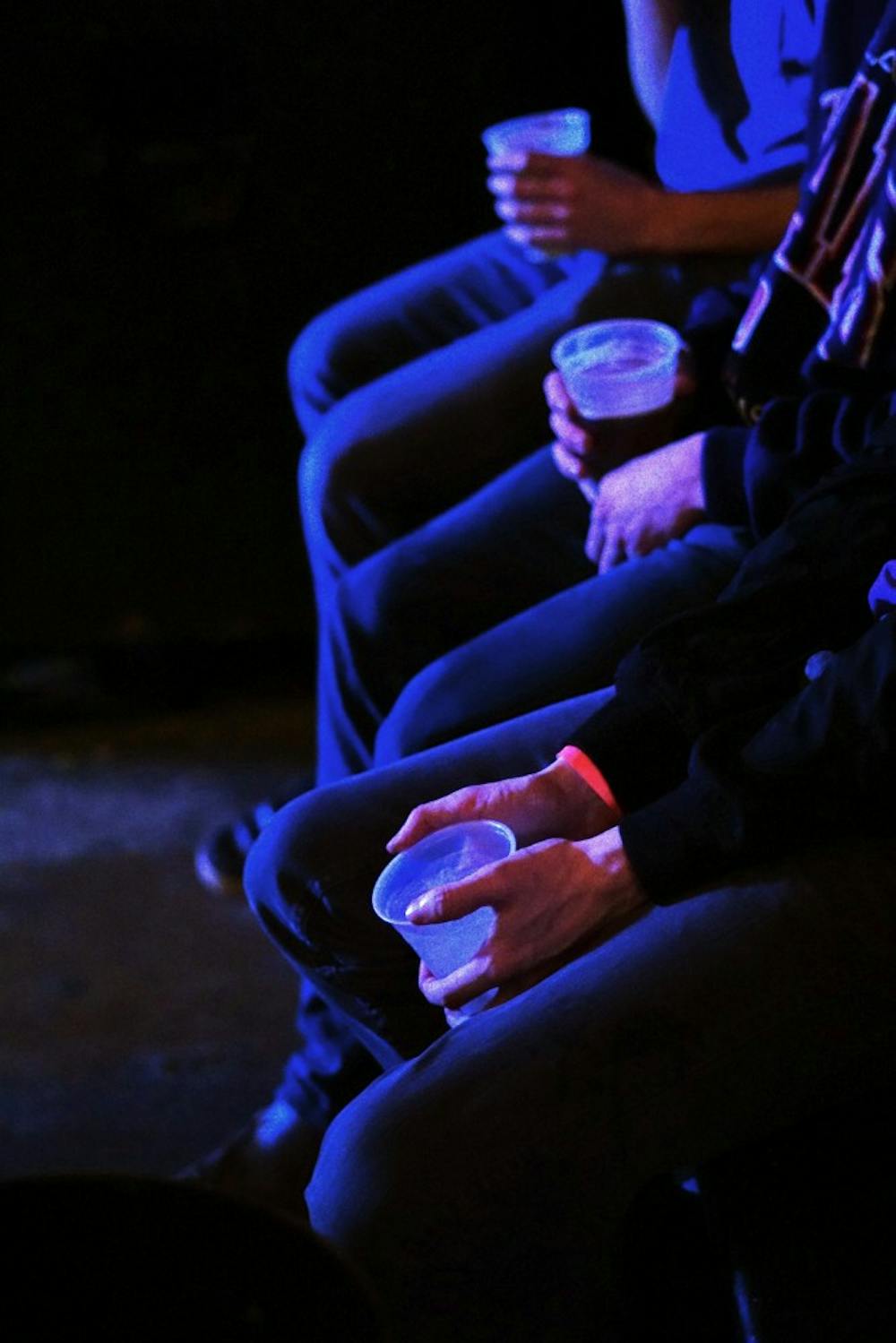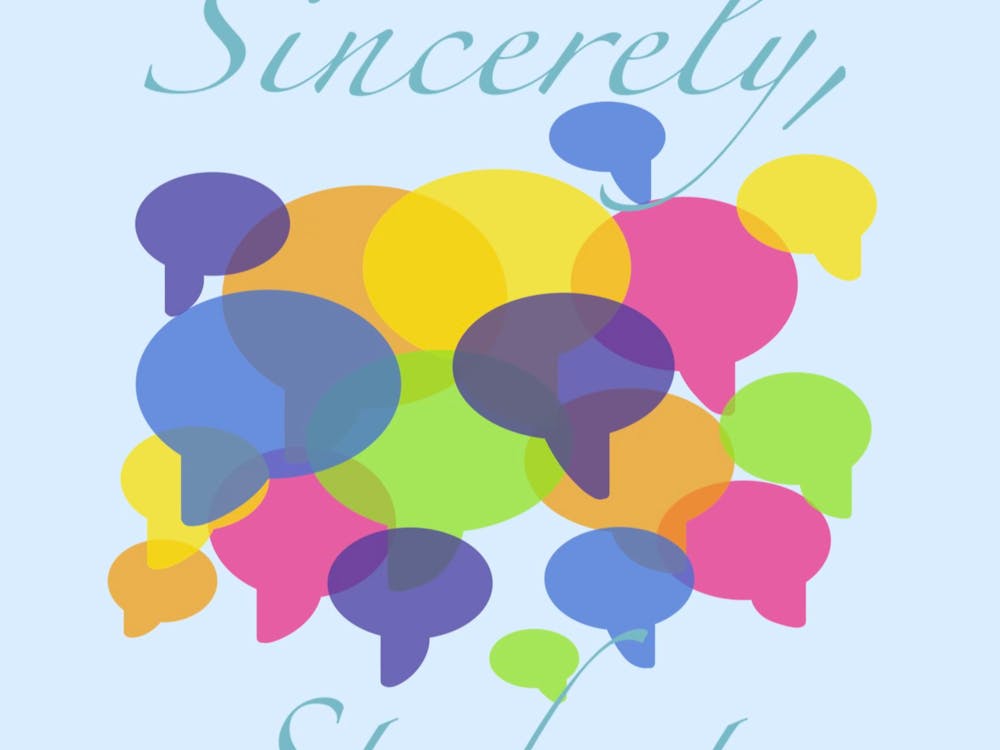[et_pb_section admin_label="section"][et_pb_row admin_label="row"][et_pb_column type="4_4"][et_pb_image admin_label="Image" src="http://miamistudent.net/wp-content/uploads/2017/04/SADdrank.jpg" show_in_lightbox="off" url_new_window="off" use_overlay="off" animation="left" sticky="off" align="center" force_fullwidth="off" always_center_on_mobile="on" use_border_color="on" border_color="#f9f9f9" border_style="solid" border_width="32px"] [/et_pb_image][et_pb_text admin_label="Text" background_layout="light" text_orientation="left" header_font="Georgia||||" use_border_color="off" border_color="#ffffff" border_style="solid"]
No matter their major, no matter what clubs they devote their time to or what fraternity or sorority they rushed, college students often agree on one thing: They are stressed.
In a world where deadlines loom on the horizon, students juggle rigorous academic course loads with extra-curriculars and a social life, stress is a shared experience. Students joke about the "Sunday scaries" as Monday approaches. They take pride in their coffee addictions. When asked how they're doing, they respond, "Hanging in there."
With these levels of stress, it's no wonder that mental health has become such a prevalent issue on college campuses. The National Alliance on Mental Health (NAMI) reports that one in four adults between the ages of 18 and 24 have a diagnosable mental illness, and 73 percent of those affected have experienced a mental health crisis while at college.
But there's another factor that can't be ignored here: alcohol. Not only are students stressed and dealing with issues such as anxiety and depression, but they are living in an environment that normalizes binge-drinking. Kip Alishio, director of Miami's Student Counseling Services (SCS), says the combination of stress and alcohol can be incredibly dangerous to students' mental health.
"The binge-drinking culture, the expectation that this is normal, exacerbates mental health concerns," Alishio said. "It actually creates mental health concerns."
Alishio and Dr. Ritch Hall, the substance abuse coordinator for SCS, explained that students come to Miami, and, motivated by a desire to fit in and a fear of missing out (FOMO), they are often encouraged within their first few weeks to go out and get blackout drunk.
Apart from the immediate dangers posed from drinking to the point of blackout, in the long-term, this behavior can lead students to use drinking as a coping mechanism.
"The more you use it to cope, the more likely you're going to be to see it as the automatic way to cope," Hall said, "and the more it's going to exacerbate the other stressors in your life -- make it harder to keep up with your classwork, make it harder to maintain your friend groups because you're the person they're babysitting or the person they're so worried about they can't even talk to anymore."
Not only are students who drink to cope potentially creating more stress in their lives, but they are also worsening their ability to deal with that stress in a healthy manner.
"The reason we call it a maladaptive coping strategy is that even though in the short term you feel good, in the long term, you're going to start to have these consequences that come from not dealing with the stressors in an appropriate way," Hall said. "What it does a lot of times is really stunt their growth, their ability to be able to handle life stressors in a way that lets them to grow into who they truly want to be."
Ashley Lillie, the resident director for Flower Hall, agrees that many students are using drinking as a coping mechanism. She points out, however, that there are plenty of other resources available for students to turn to if they are struggling.
Enjoy what you're reading?
Signup for our newsletter
SCS offers a free initial consultation, as well as free group counseling. Additionally, resident directors participate in the mental health ally program and receive training on how to engage students with emotional or mental health concerns and refer them to other support services.
"We're starting to make the resources really available and also trying to remove that stigma, like, 'It's okay not to be okay, and seek help, get resources,'" Lillie said. "We're hoping that that will start to kind of back off that need to cope with alcohol if that is what they're finding to be a comfort for any concerns that they're having."
Alexa Ross, a junior kinesiology and dietetics double major who works as the program developer for HAWKS Peer Health Educators, is also aiming to educate students on issues regarding mental health and alcohol. HAWKS, which is designed to help students learn how to make informed decisions and lead a healthy lifestyle, currently has programs that address the two issues separately.
However, Ross hopes to develop programming that acknowledges the connection between the two.
"A lot of our programs do combine those two things, but they are back-to-back," she said. "There's not necessarily a crossover area, although I do think that there is crossover, absolutely... There's definitely interplay between the two."
Focusing on education makes sense as a potential solution to these issues. As Hall and Alishio explain, many students simply don't understand the danger drinking poses to their mental health. For instance, by their definition, drinking more than five drinks in an evening is a pathological behavior -- it's alcohol abuse, a mental health condition.
Students don't believe that.
"They consider that funny, like, 'No, there's no way I could have less than that in a night,'" Hall said. "But by our standards of diagnosis, that's where we start."
Furthermore, there is a common belief among students that the behavior they exhibit in college can be easily changed once they enter the real world. Hall and Alishio pointed to the common quip, "It's not alcoholism until you graduate." Students don't recognize that by engaging in this binge drinking culture, they can potentially develop long-term issues.
"We did 392 substance abuse evaluations here at the counseling center last year," Hall said. "I wish I could tell you how many of them walked in not thinking they had a problem and left thinking they didn't have a problem."
Ultimately, however, even if students are educated on these issues, social stigma is still another major barrier to overcome. Even if a student knows or suspects that they have a problem, they might hesitate reaching out for help, held back by a fear of being judged or perceived as weak.
Newly elected student body president Maggie Callaghan experienced this firsthand during her sophomore year at Miami. Callaghan started out her semester strong, but after a couple weeks, things started to go downhill.
She began to feel withdrawn -- from her classes, her friends, her sorority. All of the things she once loved and engaged with -- writing, journalism, her political science class -- she now found no enjoyment in at all.
To treat her illness, Callaghan began attending group counseling sessions, where she discovered the power of talking about her mental health concerns. Her depression made her feel alone, and it helped to see that many other students were going through similar struggles.
Last spring, Callaghan penned an open letter to incoming President Gregory Crawford about depression, describing her personal struggles, detailing the importance of mental health on college campuses and urging Crawford to form a committee tasked with finding ways to support mental health at Miami. The feedback she received reflected what she'd felt in her group counseling -- many readers felt empowered to speak up and reach out for help. They recognized that they're not, in fact, alone.
"There's a lot of power in knowing that you're not alone and that it's okay to feel the way that you're feeling and that there resources available to help you kind of process what you're feeling," said Lillie.
Today, as the top representative of the student body, Callaghan recognizes that one of the best ways to break down stigma is to have more people talk about it. The more visual the problem becomes, the less hesitant people will be to open up about their own struggles.
"I think having more student leaders on campus be more vocal about it is huge," she said. "I think having people that you might not expect that have experienced it -- having them say, look I have gone through something, I did go talk. I think that makes people feel like, 'oh okay,' like it's not something that I should be embarrassed of or something that I should be ashamed of."
However, Alishio says that while we are making great strides as a school and as a society in breaking down the stigma surrounding mental health, we're not seeing similar progress when it comes to the stigma surrounding alcohol abuse.
"It's kind of cool now to help your friend who's got a mental health condition," Alishio said. "Students are more aware of that now than they used to be, and that's wonderful. They're not going to stand by when somebody's talking about, they want to kill themselves. They're much more engaged in that. They need to be engaged in binge-drinking in the exact same way. They need to confront their friends."
"Instead of it being normalized that we engage in this high-risk drinking culture, what if we normalized, like, going to counseling services?" Lillie said. "What if we made that the norm, of, like, 'I'm struggling with something, and instead of going out and engaging in high-risk consumption, I'm gonna go out and I'm gonna seek support from my peers.' That would be the culture change."
Callaghan does not see this as an unattainable goal. In fact, she points to the progress we've made in breaking down mental health stigma, through events such as ASG's mental health forum last fall, as evidence that we can chip away at the stigma surrounding binge drinking in the same way -- by talking about it.
"The culture of drinking at Miami isn't gonna change overnight. It's not gonna change in a year," she said. "I don't think we've ever had an honest conversation about it. We have had honest conversations about mental health, and I think we need to have a more honest conversation about alcohol."
Resources
Student Counseling Services, Oxford
(513) 529-4634
Lindner Center of Hope, Cincinnati
(513) 536-4673
Netcare Corporation, Columbus
(614) 276-2273
National Suicide Prevention Lifeline, United States
1(800) 273-8255
Office of Student Wellness Alcohol Information
https://miamioh.edu/student-life/student-wellness/alcohol-other-drugs/alcohol/index.html
National Institute on Alcohol Abuse and Alcoholism
Oxford/Hamilton/Fairfield Alcoholics Anonymous
1(800) 589-9536
[/et_pb_text][/et_pb_column][/et_pb_row][/et_pb_section]




